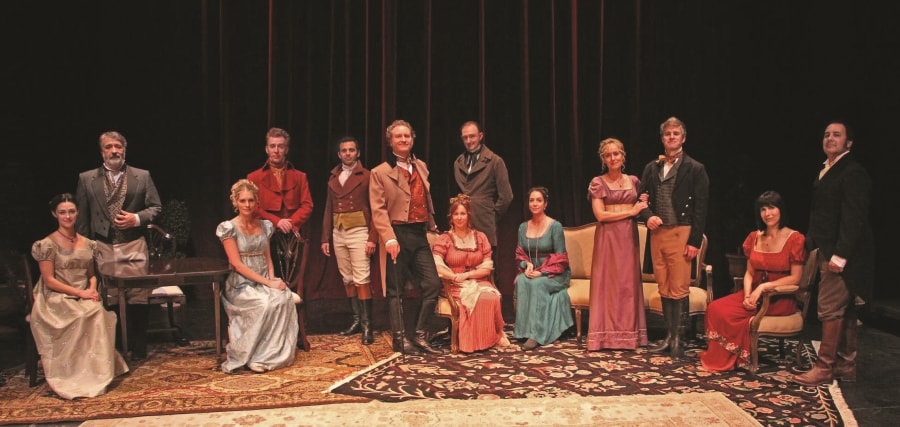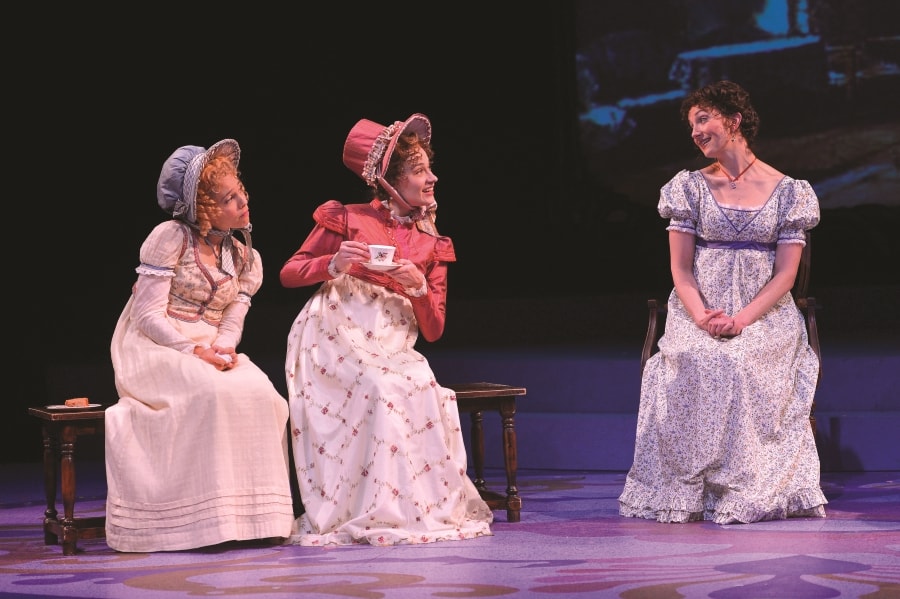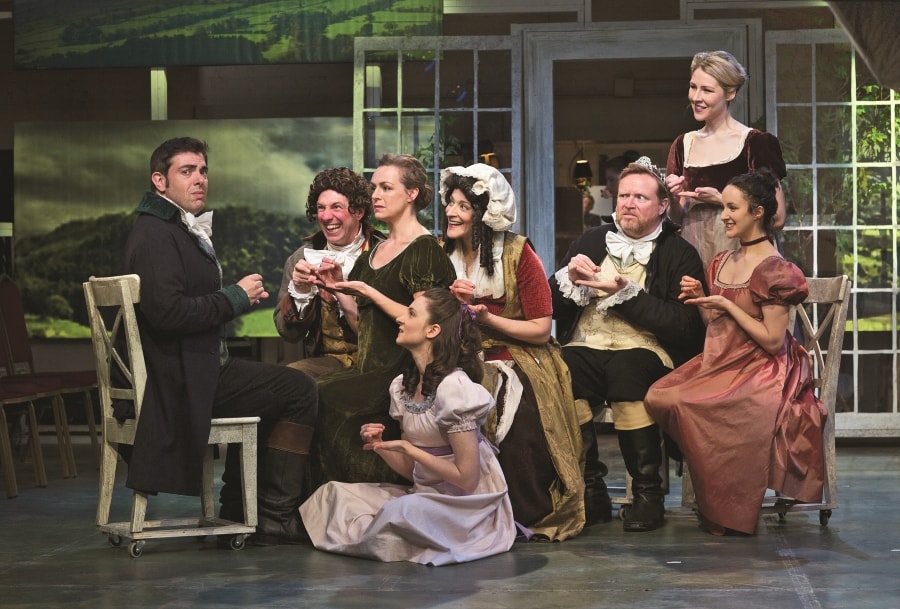Jane Austen’s six novels are full of winsome characters, well-turned marriage plots and manipulations, and timeless tropes about family, class, money, and sex. In other words, they’re ripe for adaptation, and so they have been—into films and TV miniseries, even Parisian jazz ballets, puppet shows, and musicals. Now, increasingly, Austen’s work is turning up at resident theatres all over the U.S., in a welter of versions, reverent and cheeky, musical and otherwise. And Janeites, theatregoers, fans of classic texts, and giddy young women (and men)—groups whose Venn diagrams of taste overlap considerably—are flocking to the theatre to see Jane.
Austen herself was no stranger to the theatre, visiting English stages in Bath and London throughout her lifetime. The Austen family even created “private theatricals” in their living room—amateur shows performed before an invited audience. So Austen’s stage popularity is a kind of homecoming. With the bicentenary anniversary of Austen’s publication of Emma this year, and the anniversary of her death coming up in 2017, expect to see the young Englishwoman’s name crop up more and more in season schedules.
Indeed, while stagings of Dickens consistently light up marquees during the holidays, Austen was the second most-produced literary figure on the stages of TCG member theatres with 14 productions of works based on her novels in the 2015-16 season (Harper Lee trailed not too far behind, with 8 productions of To Kill a Mockingbird). And she’s even horning in on Dickens territory: Last year Seattle’s Book-It Repertory presented an adaptation of Emma by Rachel Atkins as their holiday show; TheatreWorks in Palo Alto, Calif., reprised Paul Gordon’s musical Emma at Christmastime; and, in perhaps the truest sign that she’s arrived as a stage brand, the holiday season also included the latest mounting of Jane Austen UnScripted, an improv show by Los Angeles’s Impro Theatre.
But there are more: In February, Connecticut Repertory Theatre in Storrs, Conn., offered Joseph Hanreddy and J.R. Sullivan’s Sense & Sensibility, while Cincinnati Shakespeare Company mounted Jon Jory’s Emma and People’s Light in Malvern, Pa., staged Hanreddy and Sullivan’s Sense & Sensibility. In May, Bag & Baggage Productions in Hillsboro, Ore., performed Michael Fry’s modern adaptation of Emma, and in January, Bedlam Theatre in New York City opened a remount of its popular staging of Kate Hamill’s Sense & Sensibility, running through Oct. 2. And, again storming the Dickens holiday fortress, Lauren Gunderson and Margot Melcon have Miss Bennet: Christmas at Pemberley, an adaptation of Pride & Prejudice, set for a National New Play Network rolling world premiere this fall.
Members of the Jane Austen Society of North America (JASNA), an organization of Austen fans and scholars, are often in the audience of theatres celebrating her works. Kerri Spennicchia, the program chair of JASNA, believes that Austen’s own enthusiasm for the theatre is part of what makes her works ripe for the stage.
“Austen is very adaptable for the stage because she wrote like a screenwriter,” says Spennicchia. “While she might not be giving stage directions, we are getting direct dialogue, and we are also getting, ‘What is the character thinking in the background?’ So I think she really writes for the visual.”
“Austen has these incredible characters that are so rich and engaging,” adds Robert Kelley, artistic director of TheatreWorks. “There are only six novels put together, but it really is a treasure trove of characters.” TheatreWorks staged the world premiere of Paul Gordon’s musical adaptation of Emma in 2007; it broke box-office records. The 200th anniversary of the novel’s publication, paired with the subscribers’ pleas to revive the show, convinced Kelley to mount the show again during the 2015 holiday season, when the show broke its own box-office record, with ticket revenue of more than $500,000. “What really drove it was that it was something different at the holiday—beautiful, funny, really fun, and romantic,” explains Kelley.
Impro Theatre’s improvised Jane Austen show actually dates back to 2006, predating the current rush. “What we are trying to do with the mission of Impro Theatre is to create plays that these authors might have created, so it is not parody, per se—it is homage, if anything,” says producing artistic director Dan O’Connor. “If Jane Austen were alive, we would want her to be able to come to the theatre and recognize her style and see that we are inspired by her work.” The latest iteration of the show called on audience members to choose topics from the Regency period, the brief time in England’s history when the Prince of Wales became Prince Regent after his father King George III was declared unfit to rule. All of Austen’s novels were published during this time, which was marked by romanticism and elegance.

JASNA members from the region attended Impro Theatre’s production and provided feedback to the creative team. “We passed muster,” quips O’Connor. “They enjoyed the show and we did not transgress on their fandom of Jane Austen.” Perhaps more surprising to O’Connor were the young men in the audience. “I knew we were onto a good show when a frat boy came up to me after the show and said, ‘Dude, that show was really funny.’”
People’s Light saw lots of young couples at Sense & Sensibility—not surprisingly, as it opened over Valentine’s weekend. People’s Light also presented Hanreddy and Sullivan’s adaptation of Pride & Prejudice in 2014. Both adaptations stay true to the period and to Austen’s text. Hanreddy, who also directed the recent production, says his interest in adapting Austen was sparked by his research on the Regency Period while he was working on a production of Tom Stoppard’s Arcadia.
“I was particularly captured by the blend of the satire in the age when power and money determined all things, the nuanced, perceptive characters, and great stories that were for the most part carried through in language,” says Hanreddy.
Scott Palmer, artistic director of Bag & Baggage, gives another reason for Austen’s popularity: Her work feels particularly relevant.
“The national discussion about gender equity has worked its way to little Hillsboro, Ore., with the broader discussion of women’s voices as artists, directors, playwrights, designers—that larger national debate,” says Palmer. “Austen is a fantastic vehicle not only to highlight strong, well-written, well-crafted, powerful female characters, but also to highlight the unique contributions of Austen as a writer.”
TheatreWorks’s Kelley says he’s seen more Austen stage adaptations than ever cross his desk since the theatre premiered Emma in 2007. The proliferation has one good explanation, similar to that of Dickens’s work: “It is all public domain, so anybody that has got a chance at it, they’re writing for it,” says Kelley. “It is a fun challenge, whether it is Austen or anybody else, to condense a novel into a two-and-a-half-hour stage production.”

Bedlam Theatre’s approach to adaptation goes beyond condensing. In Kate Hamill’s adaptation of Sense & Sensibility, which first premiered in 2014, director Eric Tucker employs rolling set pieces, quick costume changes, and modern dancing. Says Tucker, “The stories are really, really good, and if you can adapt them well the trick is making them move with an energy.”
Still, Austen’s cult-like followers can exert pressure on the adaptors—or so the adaptors think. Hamill’s Sense & Sensibility has also appeared at Dallas Theater Center, and will also appear at Washington D.C.’s Folger Theatre and the Guthrie Theater in Minneapolis; she confesses that she was intimidated by JASNA and what its members might think of the liberties she took with the text. Hamill did extensive research of the time period, consulted historical fact-checkers, but still found that additional exposition for the character’s backgrounds was needed.
“Eric said, ‘You have to make it your own—it has to be your Sense & Sensibility,’ and that sort of freed me up to mess with it,” says Hamill. “I confess, when it came out I was like, ‘Oh God, people are going to know I messed with it, and Austenites are going to be at my door with pitchforks.’ Thankfully that hasn’t happened yet. We haven’t been accused of desecrating her. I was worried that with the changes there would be a big objection.”
JASNA’s Spennicchia laughs when she hears stories like Hamill’s. “I don’t think we are a group of people to be afraid of,” she says. “We each have our favorite novel, we each have our favorite character, and we each have our favorite adaptations. The only thing we are unified in is our appreciation of her works.” And in any case, Bedlam’s Sense & Sensibility has proven such a sold-out hit that Spennicchia hasn’t been able to nail down tickets. She’ll have another chance when the show comes to Folger Theatre in D.C., as JASNA will hold its general meeting with about 800 attendees to celebrate the bicentennial of Emma’s publication.
Unsurprisngly, Austen adaptations have been particularly popular with theatres that specialize in classic works, including Bedlam, the Folger, and Cincinnati Shakespeare.
“People love well-written love stories, and Jane Austen runs deeper than just love,” says Kelly Mengelkoch, who recently directed Jon Jory’s Emma at Cincinnati Shakes. “It is more than just romance; her cheeky nods at the politics at the time and the class status and the social problems are all pertinent and keep things from being trite.”
Austen’s stage popularity comes at a moment when her ubiquity in other media has reached new levels, particularly in the area of fan fiction and “paraliterature,” including the novel Pride and Prejudice and Zombies, which recently made its way to the big screen. Love & Friendship, based on Austen’s first epistolary novel, Lady Susan, was released in movie theatres in May, and a film of Sanditon, Austen’s final unfinished novel, is currently in production.
“Austen is seen as a viable market,” says Spennicchia. “Whatever is being done, it is a given that the Austen enthusiasts are going to see it—good, bad, or indifferent. We want to see her works and we want to hear her words. She is pretty much a cash cow.”


